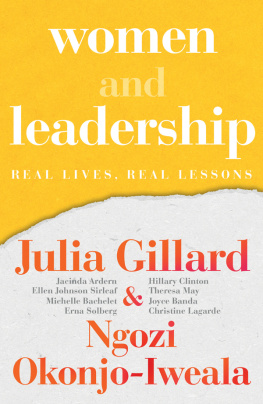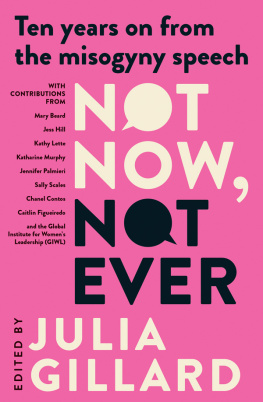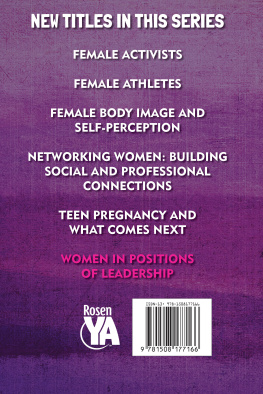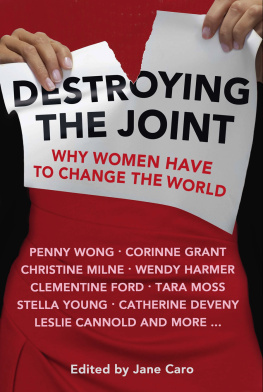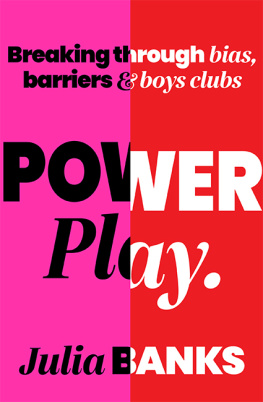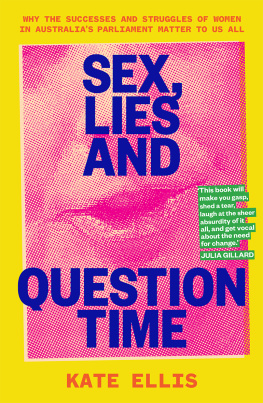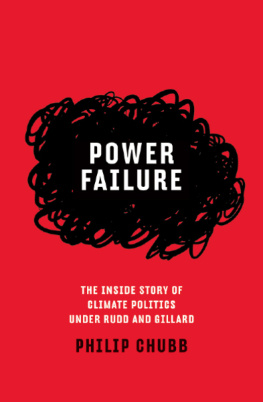Julia Gillard - Women and Leadership
Here you can read online Julia Gillard - Women and Leadership full text of the book (entire story) in english for free. Download pdf and epub, get meaning, cover and reviews about this ebook. year: 2020, publisher: Penguin Random House Australia, genre: Politics. Description of the work, (preface) as well as reviews are available. Best literature library LitArk.com created for fans of good reading and offers a wide selection of genres:
Romance novel
Science fiction
Adventure
Detective
Science
History
Home and family
Prose
Art
Politics
Computer
Non-fiction
Religion
Business
Children
Humor
Choose a favorite category and find really read worthwhile books. Enjoy immersion in the world of imagination, feel the emotions of the characters or learn something new for yourself, make an fascinating discovery.
- Book:Women and Leadership
- Author:
- Publisher:Penguin Random House Australia
- Genre:
- Year:2020
- Rating:3 / 5
- Favourites:Add to favourites
- Your mark:
- 60
- 1
- 2
- 3
- 4
- 5
Women and Leadership: summary, description and annotation
We offer to read an annotation, description, summary or preface (depends on what the author of the book "Women and Leadership" wrote himself). If you haven't found the necessary information about the book — write in the comments, we will try to find it.
Women and Leadership — read online for free the complete book (whole text) full work
Below is the text of the book, divided by pages. System saving the place of the last page read, allows you to conveniently read the book "Women and Leadership" online for free, without having to search again every time where you left off. Put a bookmark, and you can go to the page where you finished reading at any time.
Font size:
Interval:
Bookmark:

An inspirational and practical book written by two high-achieving women, sharing the experience and advice of some of our most extraordinary women leaders, in their own words.
As a result of their broad experience on the world stage in politics, economics and global not-for-profits, Ngozi Okonjo-Iweala and Julia Gillard have some strong ideas about the impact of gender on the treatment of leaders. Women and Leadership takes a consistent and comprehensive approach to teasing out what is different for women who lead.
Almost every year new findings are published about the way people see women leaders compared with their male counterparts. The authors have taken that academic work and tested it in the real world. The same set of interview questions were put to each leader in frank face-to-face interviews. Their responses were then used to examine each womans journey in leadership and whether their lived experiences were in line with or different from what the research would predict.
Women and Leadership presents a lively and readable analysis of the influence of gender on womens access to positions of leadership, the perceptions of them as leaders, the trajectory of their leadership and the circumstances in which it comes to an end. By presenting the lessons that can be learned from women leaders, Julia and Ngozi provide a road map of essential knowledge to inspire us all, and an action agenda for change that allows women to take control and combat gender bias.


Two frantically busy women chat on the sidelines of meetings held all around the world. What do they agree to do? Take a holiday? Sneak off for a day of relaxed sightseeing? Have a leisurely dinner? All enticing possibilities. But the answer is that we decided to write a book this book.
At first blush that might seem like a bit of a weird choice, and there have been moments when we have whispered underneath our breath, What on earth were we thinking? Most of the time, though, we have felt a real clarity of purpose and sense of urgency. The high-octane fuel that propelled us on is a mixture of passionate belief in gender equality and tearing frustration that we have not yet achieved it.
We know we are not the only ones who feel driven and dismayed all at the same time. However, not everyone channels that itchy kind of energy into writing a book, and we owe you an explanation as to why we did.
Our shared story starts in 2011 when, as Nigerias Finance Minister, Ngozi came to Australia for the Commonwealth Heads of Government Meeting, which Julia chaired. Bringing together the leaders of more than fifty nations in a meeting focused on democratic norms and values is serious business. Talking about it now makes Ngozi laugh, though, as she recalls trying to explain to some of her colleagues what it meant when the biographical notes on Julia said she had a partner, not a husband.
Unfortunately, the two of us met only briefly at that event but, a few years later, we ended up becoming acquaintances and then friends by being at the same international meetings. We found ourselves at many global events in our roles as chairs of major international development funds. Ngozi chairs Gavi, the Vaccine Alliance, which seeks to provide children in the developing world access to affordable vaccines that help prevent diseases like diphtheria, measles, pneumonia, polio and malaria. Julia chairs the Global Partnership for Education, which focuses on school education in the poorest countries in the world.
In the margins of these meetings we started to have hurried conversations about women leaders. There was always something happening to a female prime minister or president that we thought might be the result of gender biases, but we wanted to talk it through.
Out of these discussions, we started putting theories to each other about what was happening. However, we could never quite get to the bottom of it. Something is going on, we would mutter to each other. Women leaders all seem to be facing the same kinds of problems, we would say. Why is it as bad as this and not getting better? we would cry out in frustration between ourselves. Then Hillary Clinton lost the US presidential election, and our talks took on a new earnestness.
At some point, we started to move beyond anecdotes to more structured conversations. Both of us felt the fact that we are very different people brought a richness to our exchanges. It seemed to help us puzzle out more together than we could have done alone.
Slowly but surely, we inched our way forward to the big question: should we try to write something on women and leadership, which would further our own thinking and hopefully inform and inspire women?
Like all big projects, we started seized with inspiration, felt the muddle of the middle and had to persevere to get to the end. As we were finalising the book, the Covid-19 pandemic swept through humanity. Both of us joined the billions working from home while worrying about family, friends and the future. Ngozis workload was accelerated given her key role in the global organisation responsible for vaccines, and the need to advocate for immediate assistance to African nations as they confronted the virus. Importantly, Ngozi became a special envoy for the global initiative to accelerate the development, production and delivery of Covid-19 vaccines, therapeutics and diagnostics. Julia also experienced new demands helping the Global Partnership for Education as it urgently worked to maintain some form of educational continuity for the poorest children in the world. Tragically, prior experience with epidemics like Ebola has shown that without extraordinary efforts, child marriage soars and the most marginalised girls never return to school. At the same time, demand surged for the services of Beyond Blue, the innovative mental health body Julia chairs.
Yet out of all this pressure, doom and gloom, there are fresh insights about the value of caring work, the need for empathy and the importance of community. At the time of writing, we are both still asking ourselves the question, can we emerge from this stronger? Will we see a new global understanding about the true value of so much of what has been historically defined as womens work, a determination to address growing inequalities, an embrace of telework to provide family-friendly flexibility, and a new spirit of kindness based on the dramatic reminder of our shared humanity? Rather than resorting to the trite saying Time will tell, in our own ways, we want to be participants in distilling the lessons learnt. For now, we are pleased that we found the time needed to finalise the book between so many urgent video conferences.
In all the travel and writing time it has taken, there have been plenty of differences of opinion, but no cross words. The sense that our diversity is a huge strength has never left us.
We came to our collaboration as experienced women who had already formed our core values and outlook on the world. Let us give you an insight into our individual perspectives.
A message from Julia
I have always been a feminist. For as long as I can remember, I have believed women and men should be equal in every way. While I was a student at the University of Adelaide, I developed a deeper understanding of why and how the world was failing to live up to this simple ideal. The knowledge I absorbed came to me not through a formal course of study, but as a by-product of becoming involved in the student movement, which included many feminist thinkers.
Font size:
Interval:
Bookmark:
Similar books «Women and Leadership»
Look at similar books to Women and Leadership. We have selected literature similar in name and meaning in the hope of providing readers with more options to find new, interesting, not yet read works.
Discussion, reviews of the book Women and Leadership and just readers' own opinions. Leave your comments, write what you think about the work, its meaning or the main characters. Specify what exactly you liked and what you didn't like, and why you think so.

